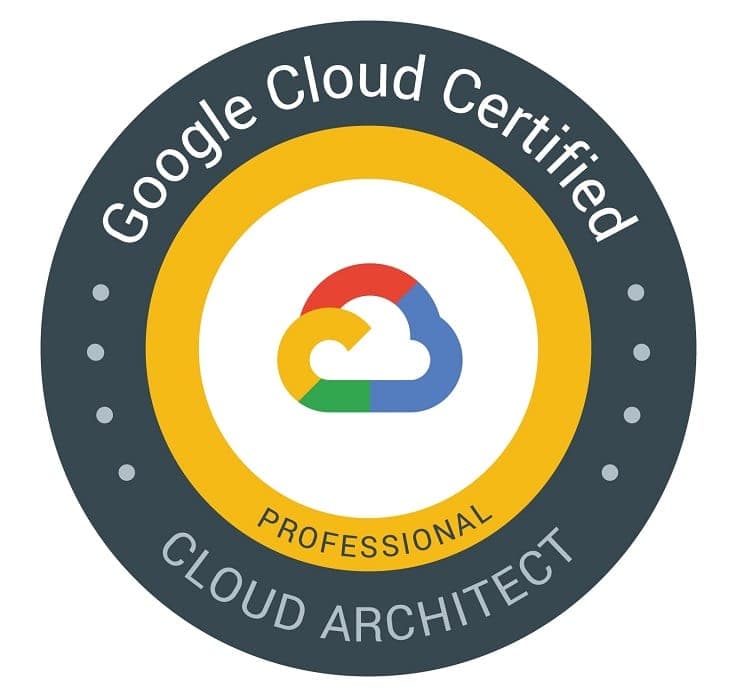Student Feedback
Associate Cloud Engineer Certification Video Training Course Outline
Google Cloud Associate Cloud Eng...
Google Cloud Regions and Zones
Google Compute Engine for Associ...
Google Compute - Optimization Co...
Gcloud for Associate Cloud Engineer
Getting Started with Instance Gr...
Load Balancing in Google Cloud P...
Managed Services in Google Cloud...
Getting Started with Google App ...
Getting Started with Google Kube...
Getting Started with Google Clou...
Google Cloud Run
Encryption in Google Cloud with ...
Block and File Storage in Google...
Object Storage in Google Cloud P...
Authentication and Authorization...
Choosing Database in Google Clou...
Exploring Database in Google Clo...
Asynchronous Communication in Go...
Private Networks in Google Cloud...
Operations in Google Cloud Platf...
Organizations and IAM - Organizi...
Pricing Calculator
Other Important Services
Getting Ready
Google Cloud Associate Cloud Engineer Certification - Getting Started
Associate Cloud Engineer Certification Video Training Course Info
Google Cloud Training: Associate Cloud Engineer Certification Path
Kick off your career in Google Cloud with the GCP Associate Cloud Engineer (ACE) certification.
What you will learn from this course
• Gain foundational knowledge to become a Google Cloud Certified Associate Cloud Engineer
• Learn how to work with Google Cloud Compute services such as virtual machines and Kubernetes Engine
• Understand Google Cloud networking fundamentals, including VPC, subnets, and load balancers
• Explore storage services like Cloud Storage, Firestore, and Cloud SQL for effective data management
• Get hands-on experience with Google Cloud databases and learn how to deploy secure applications
• Learn monitoring and logging best practices using Google Cloud tools
• Understand the process of deploying scalable and reliable cloud solutions
• Build the confidence to attempt and pass the Google Cloud Associate Cloud Engineer certification exam
Learning Objectives
The primary goal of this course is to equip learners with the knowledge and skills required to start a successful journey with Google Cloud Platform. By completing this course, learners will develop a strong understanding of Google Cloud’s core services and how they fit into real-world business use cases. Another objective is to prepare students for the Associate Cloud Engineer certification exam with practical exposure to Google Cloud tools and services. Throughout the course, learners will acquire hands-on experience by working with compute, networking, storage, and database solutions in Google Cloud. They will also gain an understanding of best practices for designing secure and resilient applications. By the end of this training, learners should be confident in setting up environments, deploying applications, managing operations, and monitoring performance on Google Cloud. This course also emphasizes cloud adoption principles that help in applying theoretical concepts to practical business challenges.
Target Audience
This course is designed for a wide range of learners who want to begin their journey in cloud computing with Google Cloud. It is ideal for students, fresh graduates, and individuals who are new to cloud platforms and want to build a career in Google Cloud. IT professionals who are transitioning from traditional infrastructure roles to cloud-based environments will find this course valuable in learning the fundamentals of Google Cloud services. Developers and system administrators looking to enhance their skills with cloud-based deployments are another target group. The course is also suitable for working professionals aiming to achieve Google Cloud certification to validate their expertise and advance in their careers. Individuals preparing for interviews or job roles that require knowledge of cloud technologies will also benefit greatly. Organizations encouraging their teams to adopt Google Cloud for digital transformation projects can recommend this course to employees. Essentially, the course welcomes anyone motivated to learn cloud computing and achieve the Associate Cloud Engineer certification.
Requirements
To enroll in this course, learners are expected to have the right mindset and motivation to pursue cloud computing as a career path. The most important requirement is a willingness to learn and practice consistently. Since the course covers foundational concepts, there is no expectation of prior Google Cloud experience. A basic understanding of IT concepts, such as operating systems, networking, or databases, can be helpful but is not mandatory. Learners will need access to a computer with internet connectivity to explore Google Cloud services during hands-on exercises. It is also necessary to have a valid debit or credit card to create a Google Cloud Platform account, as some services require account verification even when using free-tier options. Commitment and patience are essential, as mastering cloud concepts takes time and dedication. The course also requires learners to complete labs and practice activities regularly to gain confidence and practical skills.
Prerequisites
This course does not demand advanced technical expertise or previous knowledge of cloud computing. Beginners are encouraged to join, as the lessons start with fundamental concepts before moving toward more advanced topics. However, having a general familiarity with computer systems and networking basics will make the learning process smoother. Some knowledge of programming helps understand application deployment, but it is not a strict requirement. The only true prerequisites are a curious mindset, dedication to continuous learning, and a readiness to invest time in hands-on practice. Since Google Cloud provides a free trial account with credits, learners must be prepared to create and configure an account using a debit or credit card. Prerequisites also include the ability to allocate sufficient study time throughout the course and follow a structured learning approach. Learners should be comfortable with trying new tools, experimenting with services, and resolving errors encountered during practice. These skills will not only help with exam preparation but also build the problem-solving mindset required in real-world cloud roles.
Course Modules / Sections
The course is divided into well-structured modules to ensure that learners progress step by step from fundamental concepts to advanced applications in Google Cloud Platform. Each section is designed to build upon the previous one, allowing learners to gradually develop their knowledge and confidence.
The first module introduces learners to cloud computing and provides a detailed overview of Google Cloud Platform. It explains the global infrastructure, regions, zones, and the core benefits of using Google Cloud for businesses. Learners are guided on how to create a Google Cloud account and set up their first projects.
The second module focuses on compute services in Google Cloud. This includes a deep dive into virtual machines with Compute Engine, containerized applications with Kubernetes Engine, and serverless computing with Cloud Functions and App Engine. Practical exercises allow learners to deploy applications and manage workloads.
The third module explores storage solutions. Learners gain hands-on experience with Cloud Storage for object storage, Cloud SQL for relational databases, Firestore for NoSQL applications, and Persistent Disks for virtual machines. The module also covers data lifecycle management and best practices for cost optimization in storage.
The fourth module addresses networking in Google Cloud. Topics include Virtual Private Cloud (VPC), subnets, IP addressing, firewall rules, and load balancing. Learners also explore hybrid networking, VPN configurations, and interconnects for enterprise connectivity.
The fifth module introduces identity and access management. It covers IAM roles, policies, and service accounts to ensure secure access to resources. Security best practices are emphasized to help learners design robust solutions.
The sixth module deals with monitoring, logging, and operational practices. Learners work with Cloud Monitoring and Cloud Logging to track application performance, troubleshoot issues, and set up alerting systems. This section ensures that students can maintain applications in production environments effectively.
The seventh module is focused on deployment and automation. Infrastructure as code concepts are introduced with Deployment Manager and Terraform, and learners practice automating resource provisioning and scaling.
The eighth module prepares learners for real-world scenarios by presenting case studies and practical projects. By applying their knowledge to sample business problems, students build confidence in designing and managing complete cloud solutions.
Finally, the course concludes with a dedicated exam preparation module. This section reviews all important concepts, provides practice questions, and shares exam strategies to help learners succeed in the Google Cloud Associate Cloud Engineer certification exam.
Key Topics Covered
Throughout the training, learners cover a wide range of topics that align with both real-world job responsibilities and the Associate Cloud Engineer exam requirements.
One of the most important areas is infrastructure setup. Learners understand how to create and manage Google Cloud projects, configure billing, and organize resources effectively using folders and policies.
Another key topic is compute services. The course explains how to deploy and manage virtual machines, configure autoscaling, and use images and snapshots for backup. It also explores container orchestration with Kubernetes Engine, emphasizing how containers simplify application deployment.
Storage is another major focus. Learners work with Cloud Storage buckets, manage object lifecycle rules, and integrate storage with compute services. The course also dives into Cloud SQL for relational databases, Bigtable for large-scale workloads, and Firestore for application data management.
Networking concepts are covered in depth. Learners understand how to design secure networks, configure firewall rules, implement load balancers, and manage hybrid connections. VPC peering, private access, and network monitoring are also discussed to ensure a strong grasp of cloud networking.
Security and identity management are critical areas. The course covers IAM in detail, explaining how to assign roles, manage permissions, and use service accounts. Learners gain knowledge about encryption options, data security, and compliance requirements in Google Cloud.
Another key topic is monitoring and operations. Learners use Cloud Monitoring dashboards, create custom metrics, and configure logging for applications and systems. These skills are important for keeping services reliable and ensuring efficient incident response.
Automation and deployment are included to prepare learners for enterprise environments. Concepts of Infrastructure as Code are introduced, and learners practice using deployment templates. This helps them build scalable environments that can be reproduced across multiple projects.
The final important set of topics relates to the exam. Learners study exam objectives, work through practice scenarios, and understand how to approach problem-solving during the certification. This ensures they are not only technically skilled but also exam-ready.
Teaching Methodology
The teaching methodology is structured to provide an engaging, practical, and learner-friendly approach to mastering Google Cloud. It combines theoretical explanations with hands-on practice to ensure that learners develop a complete understanding of both concepts and their applications.
The first element of the methodology is guided learning. Each concept is introduced step by step with clear explanations. Real-world examples are used to make abstract topics more relatable. Visual aids such as diagrams and architectural illustrations support the theoretical lessons.
The second element is hands-on labs. Learners are encouraged to practice in the Google Cloud console by following carefully designed exercises. These labs ensure that students do not just learn the theory but also develop practical skills by applying knowledge to real cloud resources.
The third element is repetition and reinforcement. At the end of each section, learners revisit the key points through summaries and quick revision notes. This helps in retaining knowledge and preparing for the exam.
Another important element is project-based learning. Learners are given mini-projects that replicate real-world business challenges. By solving these projects, students gain confidence in using cloud services to deliver complete solutions.
The teaching approach also emphasizes problem-solving. Instead of simply demonstrating steps, learners are encouraged to troubleshoot errors, analyze logs, and optimize their solutions. This develops critical thinking and prepares them for real-world job scenarios.
Finally, the methodology includes continuous motivation. The course content is designed to keep learners engaged and make complex topics easy to follow. Encouragement and practical tips are shared throughout to maintain focus and ensure steady progress.
Assessment & Evaluation
Assessment is an integral part of the learning journey in this course. It ensures that learners can measure their progress, identify areas of improvement, and build confidence before attempting the certification exam.
The first form of assessment is through quizzes. At the end of every module, short quizzes test learners’ understanding of the key concepts. These quizzes are designed to reinforce knowledge and ensure that important details are not missed.
The second form of evaluation is hands-on practice. Learners are required to complete guided labs and practical exercises in the Google Cloud console. This practical assessment helps in translating theoretical knowledge into applied skills.
The third type of evaluation comes from project work. Learners work on case studies where they design and deploy solutions for hypothetical companies. These projects cover compute, networking, storage, and security, ensuring that learners can integrate multiple services in a single solution.
Another key evaluation tool is practice exams. The course provides mock tests that simulate the format and difficulty of the actual Associate Cloud Engineer exam. These practice exams help learners build exam-taking strategies, manage time effectively, and become comfortable with the question patterns.
Performance tracking is also encouraged. Learners are advised to monitor their quiz scores, project outcomes, and practice test results. This enables them to identify weak areas and revisit topics that need more attention.
The final form of evaluation is self-reflection. Learners are encouraged to regularly assess their confidence level with different Google Cloud services. This habit of self-assessment prepares them for both the certification and real-world challenges.
Through this structured system of quizzes, labs, projects, and mock exams, learners continuously evaluate their progress and build readiness for the Google Cloud Associate Cloud Engineer certification.
Benefits of the Course
This Google Cloud Associate Cloud Engineer course is designed to provide learners with a comprehensive understanding of cloud computing and the Google Cloud Platform. One of the main benefits is that it equips learners with industry-relevant skills that are highly sought after in today’s technology-driven world. Students who complete this course gain practical knowledge of computing, networking, storage, and database services in Google Cloud, which prepares them for real-world challenges and responsibilities.
Another significant benefit is that the course prepares learners for the Google Cloud Associate Cloud Engineer certification exam. Earning this certification validates your expertise and enhances your credibility with employers. It opens the door to higher-paying roles, career growth, and opportunities in cloud computing, IT infrastructure, development, and DevOps. The course also emphasizes best practices for deploying secure, scalable, and resilient applications, ensuring learners understand not only how to use the platform but also how to architect solutions effectively.
Learners also benefit from a structured learning path that combines theory with hands-on labs, allowing them to gain practical experience. This approach builds confidence in managing cloud resources, troubleshooting issues, and optimizing applications. The course also introduces automation and infrastructure-as-code practices, giving learners the skills needed for efficient and repeatable deployments.
The training enhances problem-solving and critical-thinking skills by presenting real-world scenarios and challenges that students must solve. By working through these scenarios, learners develop the ability to design robust cloud solutions that meet business requirements. Another key benefit is familiarity with Google Cloud tools for monitoring, logging, and security management, which are essential for maintaining reliable cloud environments.
Networking knowledge gained in the course is another major advantage. Students learn how to configure Virtual Private Clouds, subnets, firewall rules, and load balancers, providing them with the ability to design secure and efficient network architectures. Additionally, understanding identity and access management helps learners secure resources and manage user permissions effectively.
The course also benefits learners by providing exposure to multiple cloud service models, including Infrastructure as a Service (IaaS), Platform as a Service (PaaS), and serverless computing. This broad knowledge allows learners to choose the right approach for different workloads and applications. Furthermore, the course encourages learners to adopt a growth mindset and develop self-confidence by guiding them through progressively challenging exercises and projects.
Another advantage of this course is its accessibility. It is designed for beginners, with step-by-step instructions, clear explanations, and practical exercises that do not assume prior cloud experience. Learners can progress at their own pace, repeat sections if needed, and revisit labs to reinforce understanding. This flexibility ensures that even those new to IT or cloud computing can gain meaningful skills and successfully achieve certification.
Finally, the course prepares learners for long-term career success. By building a strong foundation in Google Cloud, learners can pursue advanced certifications such as Professional Cloud Architect, Professional Cloud Developer, or DevOps Engineer certifications. These pathways enable professionals to continuously enhance their skill set and remain competitive in the rapidly evolving technology landscape.
Course Duration
The course is structured to provide comprehensive learning while allowing flexibility for different learning speeds. On average, learners can expect to spend approximately 16 hours covering the entire course content. This includes video lectures, hands-on labs, demonstrations, and review sessions. The course is divided into 25 modules, each with multiple lectures, ensuring that learners progress in a logical and manageable way.
Although the total duration is around 16 hours, learners are encouraged to allocate additional time for hands-on practice, completing lab exercises, and reviewing key concepts. Practical experience is critical for retaining knowledge and building confidence for the Associate Cloud Engineer certification exam. By engaging with the labs, learners can reinforce theoretical concepts and gain real-world experience in managing Google Cloud resources.
The course duration is designed to accommodate both full-time and part-time learners. Those with more time can complete the course in a shorter period, while learners balancing work or study commitments can progress at a slower pace. The modular design allows learners to focus on one topic at a time and revisit sections if necessary.
In addition to the core video lectures, the course includes practice exercises, mini-projects, and exam preparation modules. These additional activities may require extra hours depending on how much time learners dedicate to hands-on practice. By combining the lectures with practical work, learners can gain a deeper understanding of cloud concepts and acquire skills that are immediately applicable in professional settings.
The course is structured to gradually increase in complexity. Early modules cover foundational concepts, which typically require less time to understand, while later modules introduce more advanced topics, including networking, security, monitoring, and automation. This approach ensures that learners build confidence before tackling challenging concepts and that the overall learning experience is smooth and progressive.
Tools & Resources Required
To complete this course, learners will need access to several tools and resources that facilitate hands-on practice and practical learning. The most essential requirement is a Google Cloud Platform account. Learners can sign up for a free-tier account, which provides limited access to Google Cloud services with free credits. A valid debit or credit card is required for account creation, even if only free-tier services are used.
A computer with reliable internet connectivity is also necessary to access video lectures, perform lab exercises, and interact with the Google Cloud console. Modern web browsers such as Chrome, Firefox, or Edge are recommended to ensure compatibility with the Google Cloud Platform interface. For learners interested in using command-line tools, the Cloud Shell provided by Google Cloud is accessible directly through the browser and does not require additional installation.
The course provides instructional materials, including slides, demonstration files, and practice exercises. These resources guide learners through each module and help reinforce key concepts. Learners are encouraged to download and refer to these materials while performing hands-on exercises for a better understanding of cloud services.
Some modules may introduce third-party tools or frameworks, such as Terraform or Git, for infrastructure automation and version control. While basic familiarity with these tools is helpful, detailed instructions are provided within the course to ensure that beginners can follow along without difficulty.
Additional resources include reference documentation from Google Cloud, which is accessible online. Learners can consult these references to understand service configurations, best practices, and technical details. The course encourages learners to use these official resources alongside hands-on practice to build a comprehensive understanding of Google Cloud.
Finally, the course recommends learners maintain a workspace for notes and experiment logs. Recording configurations, commands, and outcomes helps reinforce learning and serves as a useful reference when preparing for the Associate Cloud Engineer certification exam.
By combining these tools and resources, learners are equipped to gain practical experience, develop technical proficiency, and successfully achieve their certification goals.
Career Opportunities
Completing the Google Cloud Associate Cloud Engineer course opens a wide range of career opportunities in cloud computing and IT infrastructure management. The certification validates foundational skills in deploying, configuring, and managing applications on Google Cloud, which is highly valued by employers across industries. Many organizations are increasingly adopting cloud solutions, creating a growing demand for professionals who can effectively manage cloud resources, optimize performance, and ensure security.
One of the primary career paths for graduates of this course is the role of an Associate Cloud Engineer. In this role, professionals are responsible for setting up cloud environments, deploying applications, and monitoring cloud services to ensure smooth operations. They also work on troubleshooting and resolving operational issues, implementing best practices, and collaborating with development and operations teams.
Another opportunity is in the field of cloud administration. Cloud administrators are in charge of managing cloud infrastructure, configuring networks, handling storage solutions, and ensuring compliance with security policies. With the knowledge gained from this course, learners can confidently perform these tasks while adhering to industry standards.
System administrators and IT support specialists also benefit from this certification. Professionals in these roles gain expertise in migrating existing on-premise systems to Google Cloud, configuring virtual machines, and managing hybrid cloud setups. The course provides practical skills that allow IT teams to support cloud adoption and ongoing maintenance effectively.
Developers can leverage this certification to enhance their careers by integrating cloud solutions into application development. By understanding Google Cloud compute, storage, and database services, developers can build scalable and efficient applications that meet enterprise requirements. Knowledge of cloud deployment processes and best practices also enables developers to collaborate effectively with operations teams in DevOps environments.
Data engineers and database administrators are another group that benefits from Google Cloud training. The course provides exposure to Cloud SQL, Firestore, Bigtable, and other Google Cloud database services. Professionals in these roles can design and manage cloud-based data solutions, implement backup and recovery strategies, and ensure the performance and security of critical data.
For those aiming at leadership and management positions, the certification can be a stepping stone toward roles such as Cloud Architect, Cloud Project Manager, or Cloud Operations Manager. The foundational skills gained in this course are essential for understanding how cloud environments are structured and maintained, which is critical for planning large-scale deployments and guiding teams.
The course also enhances employability in consulting and enterprise services. Many organizations seek consultants who can evaluate business needs, recommend cloud strategies, and implement solutions on Google Cloud. Certified professionals are well-positioned to provide advisory services and lead cloud adoption projects.
Additionally, the increasing demand for cloud skills in industries such as finance, healthcare, technology, retail, and government ensures that certified professionals have access to a global job market. Organizations are looking for candidates who can quickly adapt to cloud platforms, optimize costs, maintain security, and deploy innovative solutions, all of which are skills taught in this course.
Freelancers and entrepreneurs also benefit from this certification. With practical knowledge of Google Cloud, they can manage their own cloud-based projects, create scalable applications, and offer cloud services to clients. This opens avenues for independent work and business opportunities in cloud consulting and solution delivery.
Overall, completing this course positions learners for a wide array of professional opportunities, enhances credibility, and builds the foundation for long-term growth in cloud computing careers. The demand for Google Cloud expertise is growing rapidly, making this certification a valuable asset for anyone looking to advance in technology roles.
Conclusion
The Google Cloud Associate Cloud Engineer course provides a structured and comprehensive pathway to mastering the essential skills required for cloud computing. Through a combination of video lectures, hands-on labs, practical exercises, and project-based learning, learners acquire both theoretical understanding and practical expertise in Google Cloud Platform.
By covering core services such as compute, storage, networking, databases, security, monitoring, and automation, the course ensures that learners develop a holistic understanding of cloud operations. These skills are not only crucial for passing the Associate Cloud Engineer certification exam but also for performing real-world tasks effectively in professional environments.
The course emphasizes practical learning and problem-solving, allowing learners to apply knowledge in realistic scenarios. By completing guided labs, mini-projects, and exercises, students gain confidence in managing cloud environments, deploying applications, configuring networks, and ensuring security. This hands-on approach ensures that learners are job-ready and capable of contributing to cloud initiatives from day one.
Additionally, the course prepares learners to achieve the Google Cloud Associate Cloud Engineer certification, which validates their expertise and enhances their professional credibility. Certification acts as proof of skills, making learners more competitive in the job market, opening doors to higher-paying roles, and enabling career advancement opportunities.
The structured learning path, combined with continuous practice and assessment, ensures that students retain key concepts, gain practical experience, and develop a problem-solving mindset. By the end of the course, learners have a strong foundation that allows them to confidently work on cloud deployments, monitor and maintain applications, and design secure and scalable solutions.
The benefits of this course extend beyond technical knowledge. Learners also develop critical thinking, planning, and operational skills that are highly valued in cloud-focused roles. The knowledge gained helps professionals transition smoothly from traditional IT infrastructure roles to modern cloud environments, bridging the skills gap in the industry.
Furthermore, the course prepares learners for continued growth in cloud computing. The Associate Cloud Engineer certification is the first step toward more advanced certifications, such as Professional Cloud Architect, Cloud Developer, and DevOps Engineer. By building a strong foundation, learners are well-positioned for lifelong learning and career progression in the fast-evolving cloud ecosystem.
In summary, this course equips learners with the skills, confidence, and certification readiness required to excel in cloud computing roles. It combines theory, practice, and assessment in a structured format, ensuring that students are fully prepared to enter the world of Google Cloud with competence and confidence.
Enroll today
Take the first step toward a rewarding career in cloud computing by enrolling in the Google Cloud Associate Cloud Engineer course today. By joining this course, you gain access to comprehensive training, hands-on labs, practical exercises, and expert guidance that will prepare you for both certification and real-world challenges.
Whether you are a beginner exploring cloud computing, an IT professional seeking career growth, a developer aiming to enhance application deployment skills, or a professional looking to validate your expertise, this course provides the knowledge and resources necessary for success.
Enrolling in this course allows you to learn at your own pace, revisit modules as needed, and gain practical experience with Google Cloud services. You will also become part of a community of learners who are advancing their careers in cloud computing, providing opportunities for collaboration, support, and networking.
Start building your cloud skills today, achieve Google Cloud Associate Cloud Engineer certification, and position yourself for a successful career in the rapidly growing field of cloud computing. The journey begins with a single step, and enrolling in this course ensures that you are guided every step of the way with structured content, expert instruction, and hands-on practice.
By enrolling, you commit to building expertise, gaining confidence, and achieving career advancement in one of the most in-demand technology areas. Google Cloud knowledge is a gateway to numerous opportunities, and this course equips you with everything needed to succeed in cloud computing roles and beyond.













